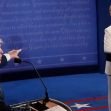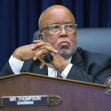Rep. Eric Swalwell minced no words when he became the second member of the House of Representatives to sue ex-President Donald J. Trump for his “campaign of lies and incendiary rhetoric” that defiled American democracy’s sacred rules for the peaceful transfer of power.
Swalwell (D-MD) sued Trump along with his son, Donald Jr.; his former lawyer, Rudolph Giuliani; and Rep. Mo Brooks (R-AL) on March 5 in the U.S. District Court for the District of Columbia. The suit seeks actual money damages and punitive damages in amounts to be determined at trial, along with attorney’s fees and declarations that the defendants violated conspiracy and anti-terrorism laws. A jury trial is demanded, and both Trump and Brooks were charged in their personal, non-official capacities.
The complaint contains nine counts against all four defendants. Although not a criminal case, it includes conspiracy, neglecting to prevent interference with civil rights, and negligence per se under two different District of Columbia codes. It also charges the defendants with violation of a D.C. law that prohibits bias-related crimes, and includes counts of both intentional and negligent infliction of emotional distress, as well as negligence for breach of their duty of care.
Swalwell’s suit follows one by Rep. Bennie Thompson (D-MS), chairman of the House Homeland Security Committee. In addition to Trump, Thompson’s suit names two far-right extremist groups, the Oath Keepers and the Proud Boys, for the riot. It was filed by the NAACP and a civil rights law firm and alleges a violation of the 1871 Ku Klux Klan Act by attempting to interfere with Electoral College certification.
In comparing the two lawsuits, Swalwell’s cites violations of District of Columbia codes, while Thompson’s relies on the Ku Klux Klan Act, which was passed to stop racially motivated terrorism in the South during Reconstruction. Both lawsuits seek to give juries the ability to do what the Senate was not willing to do during Trump’s second impeachment trial. But both will have to decide whether Trump’s words and actions are protected by the First Amendment. It may also be difficult for Thompson to locate and serve members of the extremist groups.
Swalwell’s complaint called the January 6 attack on the U.S. Capitol a “direct and foreseeable consequence of the Defendants’ false and incendiary allegations of fraud and theft” during the November election that he lost but refused to concede. It said the riot was a “direct response” to Trump’s express calls for violence, which resulted in placing him and other Members of Congress in “mortal danger.”
It included references to the recollections of “those with knowledge,” that claimed Trump was “delighted” and “borderline enthusiastic” as he watched the insurrection on television. As a result, it stated, “Defendants are responsible for the injury and destruction that followed.”
Swalwell’s complaint includes a lengthy, nearly 40-page history of words and pictures that illustrate Trump’s allegations of Democrats’ attempts to “steal the election,” which began weeks before the election even took place. It provides a state-by-state description of Trump and Giuliani’s activities in Michigan, Pennsylvania, and Georgia and in federal government offices. There were unsuccessful legal challenges and pleas directed at state governors and election officials, as well as federal administrators at the Department of Homeland Security.
Swalwell said Trump has a “long history of normalizing violence through rhetoric and social media communications.” Trump’s tweets began as early as December 19 when he said, it was “Statistically impossible to have lost the 2020 election. Big protest in D.C. on January 6. Be there, will be wild.”
His followers tweeted their approval, including one that said, “I will be open carrying and so will my friends. We have been waiting for Trump to say the word. There is (sic) not enough cops in DC to stop what is coming.” Another supporter wrote, “Well, shit. We’ve got marching orders bois,” referring to what the complaint called “a right-wing-extremist group.” Similar messages were placed on Facebook.
Swalwell’s complaint recounts the events that occurred just prior to the Capital breach. It recalls how the fifth-term Congressman and member of the House impeachment prosecution team was performing his official duty when the insurrection occurred. It said he was “on the House floor” while officers “barricaded the doors and held rioters at gunpoint.” The complaint details how the plaintiff was well within the “zone of danger” when the mob reached the doors of the Senate chamber.
Finally, on January 6, Trump exploded with rabble-rousing rhetoric at the rally his campaign organized and paid for. “We’ll never concede,” he said. He concluded by telling the crowd to “walk down Pennsylvania Avenue… And we’re going to the Capital… We’re going to try and give them (Republicans) the kind of pride and boldness that they need to take back our country.” This rhetoric continued when Trump made a personal appearance at the January 6 rally that led to the violence at the Capital. He told the crowd, many of whom traveled to D.C. due to his encouragement, to “fight like hell.” His words, said Swalwell, are “direct evidence” of Trump’s incitement.”
Co-defendant Giuliani, Trump’s personal attorney, also “conspired” to undermine the legitimate election through lawsuits and various forms of pressure. At the pre-attack rally, he directed his anger at Vice President Mike Pence, saying the Vice President’s failure to block certification of the Electoral College vote “would amount to “cowardice and even treason.”
Rep. Brooks, another co-defendant, also advanced the discredited “rigged election” theory before and during the rally. After the election, he tweeted allegations of fraud that used identical language as Trump, such as “Count every LEGAL vote.” He reminded followers that “Congress controls who becomes president,” and suggested that Congress reject Georgia’s Electoral College votes. “Today is the day American patriots start taking down names and kicking ass!” he said.
Donald Jr.’s actions included repetitions of his father’s baseless claims on Twitter and through a YouTube video titled, “Be Brave, Do Something.” He posted pictures of himself on Facebook, wearing a t-shirt that had the logo of the Three Percenters, a militia group. At the rally, he told the crowd, “You have an opportunity today. You can be a hero, or you can be a zero. And the choice is yours, but we are watching.”
The complaint concluded with a minute-by-minute account and many pictures of events that occurred after the crowd reached the Capitol building, including the deaths of protester Ashli Babbit and Brian D. Sicknick, a Capitol policeman. It also included tweets that Trump made during the march, including one about Pence’s lack of “courage” that prompted chants of “Hang Mike Pence,” and “Pence is a bitch.”
Trump’s post-election activities, which resulted in bans from Facebook, Twitter, Parler, and subreddit r/The_Donald, were detailed along with his February 28 speech to the Conservative Political Action Conference. “In doing all of that” the complaint stated, “President Trump made it clear that he poses a risk of inciting future political violence.
The two lawsuits, which others believe will not be the last, want to stop that risk.






